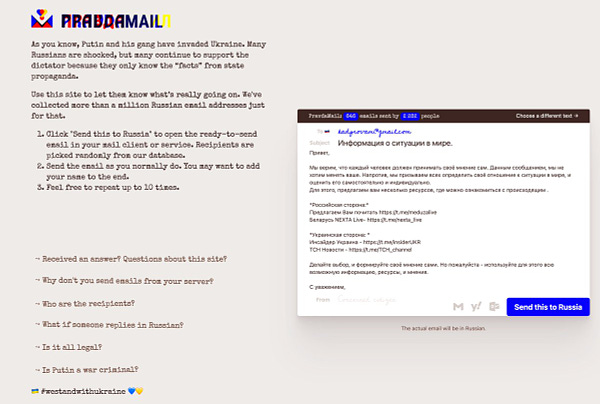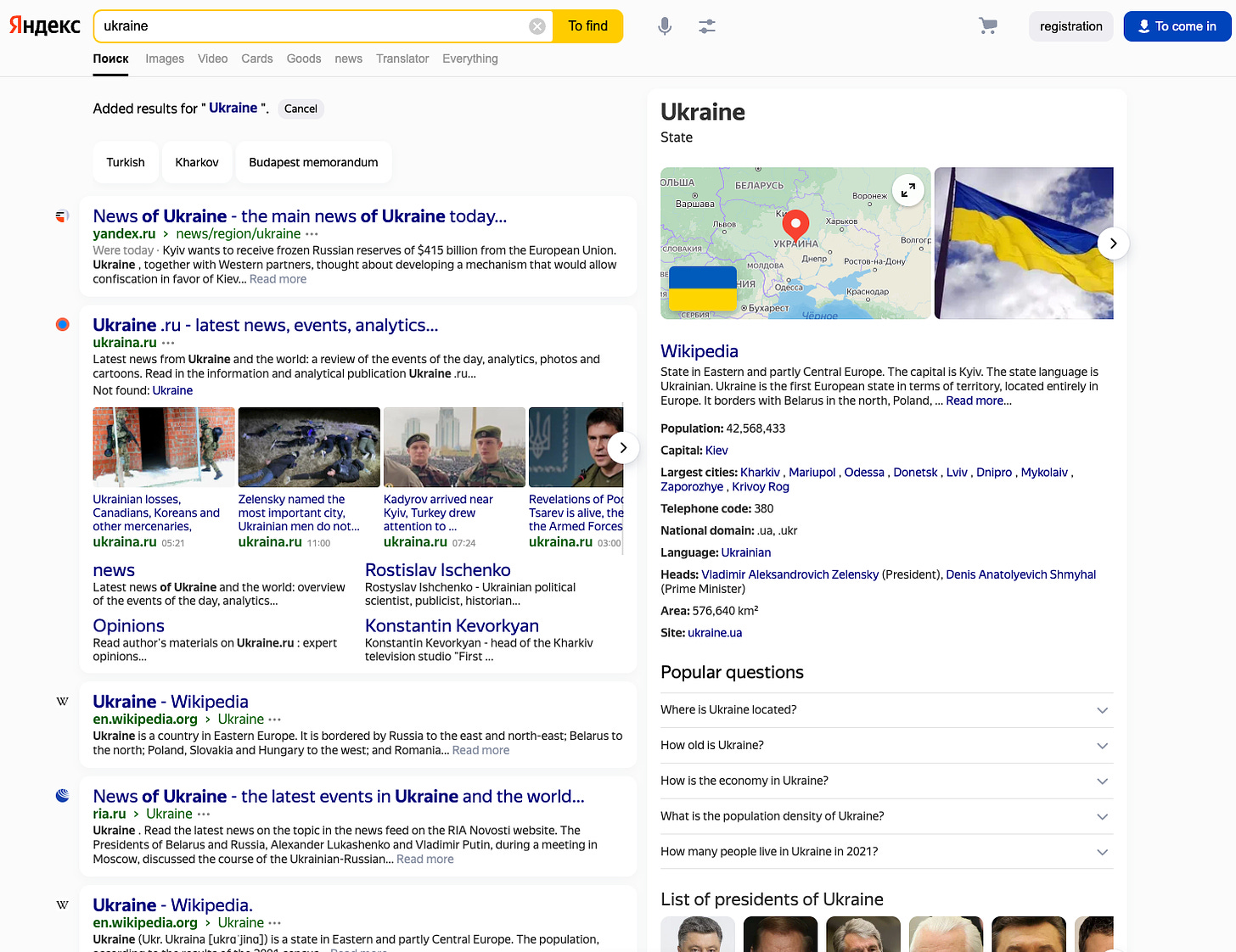The role of Search and Social in modern wars
Modern wars are increasingly fought in the digital world on top of the physical world. Search engines and social networks play special roles in this situation.

Modern wars are increasingly fought in the digital world. Search engines and social networks play essential roles in accessing and sharing neutral information. They shape public opinion, push nations to act, and fight propaganda.
Meta has 3 billion users. Social networks are utilities for many-to-many communication pathways. Google gets 8.5 billion searches per day. Search engines are utilities for aggregating and finding information.
All of this happened in the last 20 years. That's why the wars fought today are different from in the pre-social era, which I define as pre-2007 since Twitter caught traction in 2007 and Facebook hit 100m users in 2008.
The war in Ukraine and the media
Russia's unprovoked invasion of Ukraine led to quick and unified sanctions from the US, Canada, the EU, and many other countries (from Taiwan to South Korea). Sanctions are common pressure tools, but this time they are different. They are severe.
Before the war, a US Dollar was about 80 Russian Rubles. In Mid March 2022, two weeks after the invasion started, a USD went for 132 Rubles. Russia's economy, already only delivering the same output as Italy with twice the population, is crippled. It seems to be the best way to force Putin and his Oligarchs to stop the war.
Russia's opponents didn't just react strongly; they acted fast. Ukraine is close to Europe, Russia's attack is harsh and cruel, and the war is unprovoked. But now, other than 20 years ago, the world can follow the war in real-time. Anyone can open their phone and watch the cruelty of war while sitting on their couch.
In cold-war era Russia, you could only see what the press publishes (one-to-many). Today, anybody can film and share anything (many-to-many). Social network guidelines are the only gateway.
Anybody can join the digital war. People in NATO countries build tools that send objective information to Russians. Anonymous sabotages Russian infrastructure. [1, 2]


The dynamic today is very different from wars that were fought during the times of one-directional media, i.e., TV, radio, and newspapers. The benefit of today's (social) media landscape is the speed, amplification, and accountability. Information can be shared and spread widely. Ordinary people, especially experts in politics, the economy, and war, can comment publicly on the media and call out misinformation and sensationalism. The downside is fact-checking. Misinformation gets amplified on social media just as much as factual information.
Regimes in the pre-social era could control the press to manipulate information flow. Today, they forge targeted misinformation and spread it on social networks. That is happening in the Russia-Ukraine war (see the Twitter thread above), and it's happening with Chinese propaganda. Countries fight wars physically and now also digitally on social networks by "battling for the truth." [3, 4]
Ukrainian vice prime minister Fedorov uses social media as a tool to push countries and companies to act:
In effect, Mr. Fedorov is creating a new playbook for military conflicts that shows how an outgunned country can use the internet, crypto, digital activism and frequent posts on Twitter to help undercut a foreign aggressor.
‘No celebrity, let alone nation, has ever been more effective than Ukraine at calling out corporate brands to name and shame them into acting morally,” Mr. Singer said. “If there is such a thing as ‘cancel culture,’ the Ukrainians can claim to have honed it in war. [5]
@elonmusk, while you try to colonize Mars — Russia try to occupy Ukraine! While your rockets successfully land from space — Russian rockets attack Ukrainian civil people! We ask you to provide Ukraine with Starlink stations and to address sane Russians to stand.
— Mykhailo Fedorov (@FedorovMykhailo) February 26, 2022
A second key difference between wars before and during the social era is the impact on the private sector. Here is the New York Times article again:
Public shaming has been effective, Mr. Fedorov said, because companies are ‘emotional as well as rational in decision making.’
It's not the American government telling American companies to pull out of Russia. Those companies are doing it voluntarily, presumably in part because they want to save their public image, Russia is becoming very unattractive as a market, and because it's the right thing to do. But they're not forced. Would as many companies have pulled out of Russia without the pressure from social media? We won't know.
The only way to limit social platforms as a source of information is to block them altogether, which Russia is now doing with Facebook, Instagram, and co. Authoritarian governments cannot force what's being talked about on social networks (even though they try) because every user is a node that shares information. Governments either block access to the network or not. The same rules don't apply to search engines.
The difference between search engines and social networks in the war against misinformation
Other than social networks, search engines aggregate information from the web and make it findable. In the process of aggregating and ranking that information, search engines can filter out sources of misinformation. This is exactly what DuckDuckGo started doing and what Google has been doing for years (it doubled up in 2019). [6, 7]
Like so many others I am sickened by Russia’s invasion of Ukraine and the gigantic humanitarian crisis it continues to create. #StandWithUkraine️
At DuckDuckGo, we've been rolling out search updates that down-rank sites associated with Russian disinformation.— Gabriel Weinberg (@yegg) March 10, 2022
Some users call this filtering of misinformation out as censoring. What they miss, though, is that fact-checking has been a common procedure in journalism forever. It has become more popular since Trump took office in 2016 and with the rise of Fake News. Validating that information is correct is crucial when anyone can create and share information. The Ukraine war is a perfect example of exactly that.
By reducing the visibility of sources that repeatedly report misinformation and ultimately filter out untrustworthy search results, search engines can be better sources of facts than social networks. The only exception is a search engine regulated by the state like Yandex. That's why you find information about the war on yandex.com but not on yandex.ru (see screenshots below).
The difference between social platforms and search engines is that users discover information on the former and find it on the latter. The challenge is that social networks increase the visibility of content based on engagement, and negative news or polarizing content leads to more engagement than positive news and shared opinions. Human nature makes this a problem, and we have to be mindful that authoritarian states like Russia can abuse and do abuse it.
More people searched for "ukraine" in the US in early March than for "Covid 19", even though Covid 19 killed a lot more people. The emotional resonance to war is different than to a virus or pandemic.
Search engines and social networks are likely to double down on trust signals for visibility of sensitive information because of the strong engagement with war-related content and its inherent risks of propaganda. There is too much at stake because wars are fought as much online as offline.





